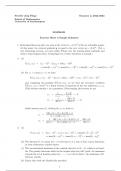POETRY
Sonnet 18 by William Shakespeare
1. Summary of the poem
The speaker begins by asking whether he should or will compare "thee" to a
summer day. He says that his beloved is more lovely and more calm or stable.
He then runs off a list of reasons why summer isn’t all that great: winds shake
the buds that emerged in Spring, summer ends too quickly, and the sun can get
too hot or be hidden by clouds.
He argues that everything beautiful eventually fades by chance or by nature’s
inevitable changes, however, his beloved’s summer (or happy, beautiful years)
will never fade away. Moreover, death will never be able to take the beloved,
since the beloved exists in eternal poetry. The speaker concludes that as long as
humans exist and can read, the poem he’s writing will live on, allowing the
beloved to keep living as well.
2. Type and form
‘Sonnet 18' is an Elizabethan sonnet. It consists of three quatrains followed by a
rhyming couplet. The poem is written in fourteen lines in iambic pentameter. Its
rhyme scheme is abab cdcd efef gg.
3. Themes
LOVE/TIME
The speaker’s beloved beauty will never fade because he is putting it into verse
which will last forever. Everything is subject to the passage of time and change,
even the beauty of the speaker’s beloved.
4. Tone and mood
Endearing/adoration/affection/devotion
The tone of this poem change between pessimism and optimism. On the one
hand, the poet talks about how nothing is permanent. On the other hand, the
poet also asserts the immortality of his beloved; the speaker knows that long
after he is gone, this poem will continue to be read and appreciated.
Spring by Gerald Manley Hopkins
1. Summary of the poem
In this sonnet, the speaker celebrates the beauty of nature and the glory of God.
1
, 2. Type and Form
The poem ‘Spring’ is an Italian/Petrarchan sonnet; it comprises of 14 lines. The
first eight lines are referred to as the octave. The last six lines are referred to as
the sestet. The rhyme scheme is abba abba cdcd cd.
3. Themes
Innocence
The speaker admires and loves springtime, as it is a time for renewal. Spring is
innocent – harmless, and free from guilt and sin, whereas humans deliberately
disrupt and destroy these peaceful and productive cycles.
Humans need to be as innocent (well-behaved, kind and loving) as lambs (line
8).
The poet believes that spring is like when God created the world; he imagines it
was a hopeful and innocent time.
He thinks back to Eden, the paradise that was supposed to exist before humans
were on the earth (line 11).
The unique and special nature of the universe Everything, no matter how small,
is meant to be on earth. Each object and action has purpose. e.g.
• The weeds are patterned in ‘wheels’. They have their own purpose (line
2).
• The thrush’s eggs are little versions of ‘heaven’ (line 3) – perfect and new
each time, even though there are so many of them.
• The thrush’s song ‘wrings’ our ears and reminds us of how beautiful and
wonderful nature is (lines 2-3).
Human’s physical and spiritual needs
Humans must change their attitudes so they can appreciate all the wonderful
things on our planet.
Humans form part of a species that must live peacefully with other species.
Everything in nature has a place (even weeds) – and humans need to understand
and enjoy the earth. Instead, humans often damage and destroy beautiful places.
4. Tone and Mood
Octave
• Jovial and full of celebration
2
Sonnet 18 by William Shakespeare
1. Summary of the poem
The speaker begins by asking whether he should or will compare "thee" to a
summer day. He says that his beloved is more lovely and more calm or stable.
He then runs off a list of reasons why summer isn’t all that great: winds shake
the buds that emerged in Spring, summer ends too quickly, and the sun can get
too hot or be hidden by clouds.
He argues that everything beautiful eventually fades by chance or by nature’s
inevitable changes, however, his beloved’s summer (or happy, beautiful years)
will never fade away. Moreover, death will never be able to take the beloved,
since the beloved exists in eternal poetry. The speaker concludes that as long as
humans exist and can read, the poem he’s writing will live on, allowing the
beloved to keep living as well.
2. Type and form
‘Sonnet 18' is an Elizabethan sonnet. It consists of three quatrains followed by a
rhyming couplet. The poem is written in fourteen lines in iambic pentameter. Its
rhyme scheme is abab cdcd efef gg.
3. Themes
LOVE/TIME
The speaker’s beloved beauty will never fade because he is putting it into verse
which will last forever. Everything is subject to the passage of time and change,
even the beauty of the speaker’s beloved.
4. Tone and mood
Endearing/adoration/affection/devotion
The tone of this poem change between pessimism and optimism. On the one
hand, the poet talks about how nothing is permanent. On the other hand, the
poet also asserts the immortality of his beloved; the speaker knows that long
after he is gone, this poem will continue to be read and appreciated.
Spring by Gerald Manley Hopkins
1. Summary of the poem
In this sonnet, the speaker celebrates the beauty of nature and the glory of God.
1
, 2. Type and Form
The poem ‘Spring’ is an Italian/Petrarchan sonnet; it comprises of 14 lines. The
first eight lines are referred to as the octave. The last six lines are referred to as
the sestet. The rhyme scheme is abba abba cdcd cd.
3. Themes
Innocence
The speaker admires and loves springtime, as it is a time for renewal. Spring is
innocent – harmless, and free from guilt and sin, whereas humans deliberately
disrupt and destroy these peaceful and productive cycles.
Humans need to be as innocent (well-behaved, kind and loving) as lambs (line
8).
The poet believes that spring is like when God created the world; he imagines it
was a hopeful and innocent time.
He thinks back to Eden, the paradise that was supposed to exist before humans
were on the earth (line 11).
The unique and special nature of the universe Everything, no matter how small,
is meant to be on earth. Each object and action has purpose. e.g.
• The weeds are patterned in ‘wheels’. They have their own purpose (line
2).
• The thrush’s eggs are little versions of ‘heaven’ (line 3) – perfect and new
each time, even though there are so many of them.
• The thrush’s song ‘wrings’ our ears and reminds us of how beautiful and
wonderful nature is (lines 2-3).
Human’s physical and spiritual needs
Humans must change their attitudes so they can appreciate all the wonderful
things on our planet.
Humans form part of a species that must live peacefully with other species.
Everything in nature has a place (even weeds) – and humans need to understand
and enjoy the earth. Instead, humans often damage and destroy beautiful places.
4. Tone and Mood
Octave
• Jovial and full of celebration
2




